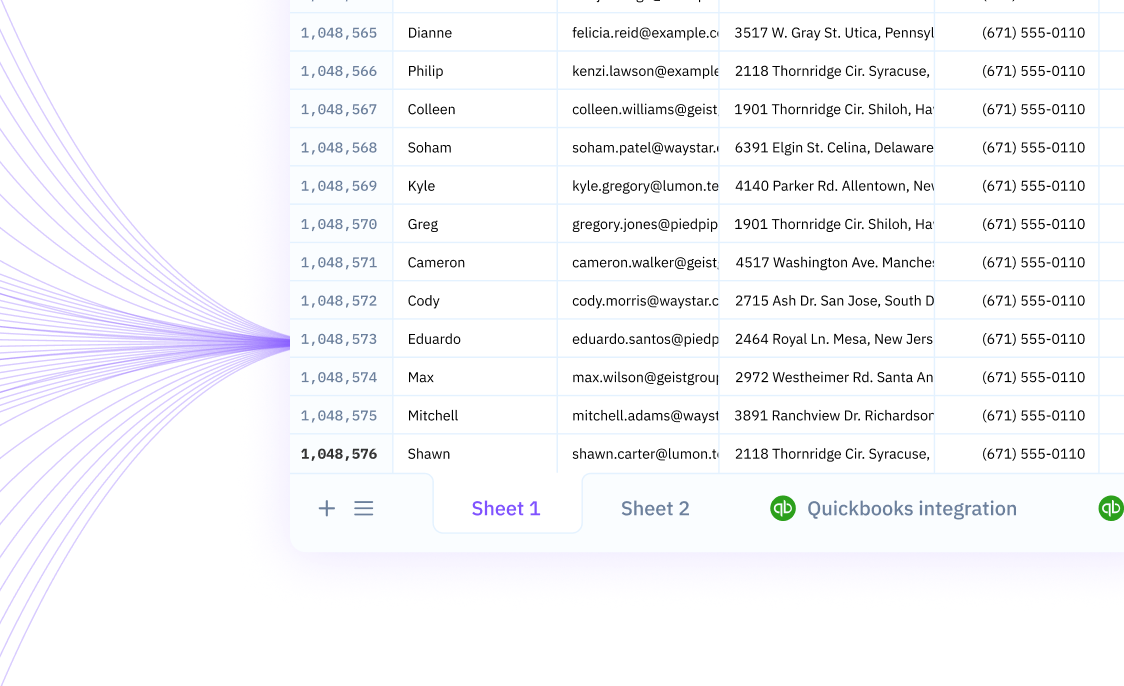
Export PCAP to CSV

Overview
Packet Capture (PCAP) files are a valuable resource in network analysis, providing detailed data about network traffic. Exporting these files to a Comma Separated Values (CSV) format enhances their utility by enabling easy exploration of different column combinations and supporting machine learning workflows when loaded into a spreadsheet application. On this page, we will delve into what PCAP is, guide you through the process of exporting PCAP to a CSV file, and discuss various use cases for this conversion. Additionally, we'll introduce an alternative to CSV exports for PCAP using Sourcetable, and provide a comprehensive Q&A section about exporting PCAP to CSV to further aid your understanding.
Understanding PCAP
PCAP can refer to various concepts depending on the context. As a software tool, easyANALYZER is known as a PCAP tool used for the parameterization, analysis, and fine-tuning of PCAP sensors. This specialized software assists in optimizing the function and performance of PCAP technology.
When discussing services, PCAP stands for the Parent-Child Assistance Program, designed to support mothers with alcohol and drug use disorders. This service aims to prevent the birth of subsequent alcohol- or drug-exposed infants. It operates on relational theory, motivational interviewing, and harm reduction principles, and includes home visits as a key component of its approach. PCAP services are provided by qualified staff and are available in several countries, including the United States, Australia, and Canada.
In the realm of data, PCAP represents Packet Capture, which is a file format that stores and captures network packet data. These files are crucial for network analysis, troubleshooting, and security assessments. Generated by tools like Wireshark and tcpdump, PCAP files are essential for professionals who require detailed insights into network traffic for performance optimization and risk identification.
Exporting PCAP to a CSV File
Using Wireshark
Wireshark is a versatile tool that can convert packets in a .pcap file to a .csv file. To perform this conversion, open the .pcap file within Wireshark and apply any necessary filters to select the specific packets you wish to export. Once filtered, navigate to File->Packet Dissections->As CSV in the Wireshark interface. Proceed to save the file in CSV format. This method is suitable for individual files but may not be efficient for converting a large volume of .pcap files.
Using tshark
tshark, the console application counterpart to Wireshark, also facilitates the conversion of .pcap files to .csv format. It is particularly useful for scripting and handling batch conversions. Utilize tshark with the -T option followed by "fields" to specify that the output format should be CSV. This tool offers a practical solution for converting multiple .pcap files to .csv efficiently.
Streamline Your Data Analysis with Sourcetable
With the advent of Sourcetable, importing PCAP files into a spreadsheet has become more efficient than the traditional method of exporting to CSV and then importing into another spreadsheet program. Sourcetable's ability to sync live data from various apps or databases directly into its platform is a game-changer. This seamless integration not only saves time but also maintains the integrity of your data by eliminating the extra step of conversion to CSV.
By using Sourcetable, you can take advantage of a familiar spreadsheet interface which simplifies querying and manipulating data. This is particularly beneficial for those accustomed to traditional spreadsheet programs but looking for more robust automation and business intelligence features. Sourcetable's approach enhances productivity and allows for real-time data analysis, providing you with up-to-date insights that are critical for informed decision-making.
Common Use Cases
-
Data analysis using spreadsheet softwareP
-
Extraction of specific packet detailsP
-
Filtering and exporting a subset of network traffic dataP
Frequently Asked Questions
Can Wireshark output packets as a .csv file?
Yes, Wireshark can convert a .pcap file to a .csv file and output packets in this format.
How do I convert a PCAP file to a CSV file using Wireshark?
To convert a PCAP to CSV using Wireshark, open the .pcap file, apply any necessary packet filters, and then go to File->Packet Dissections->As CSV ..., and select Displayed in Packet Range to export only filtered packets.
Will converting a PCAP to CSV with Wireshark or tshark retain all packet details?
No, exporting a PCAP to CSV does not retain all details defined in the PCAP. Both Wireshark and tshark only export general information about packets when converting to CSV.
Can I use the console to convert a PCAP to a CSV file?
Yes, you can use tshark in the console to convert a PCAP to a CSV file. Use the -T option with tshark to perform this conversion.
Do CSV files contain packet detail information similar to PCAP files?
No, CSV files do not contain packet detail information. They only export general information about packets, whereas JSON and plain text formats structure packet detail information differently.
Conclusion
Converting PCAP files to CSV format is a straightforward process using tools like Wireshark and tshark. Wireshark offers a user-friendly graphical interface where you can open the .pcap file, apply filters to select specific packets, and then export the dissected packets using the File->Packet Dissections->As CSV function. Alternatively, tshark provides a command-line option that can be especially useful for scripting or batch processing, using the -T flag to specify 'csv' as the output format. While these methods are efficient for exporting data to CSV, you can simplify your workflow even further by using Sourcetable, which allows you to import your data directly into a spreadsheet. Sign up for Sourcetable today to get started and streamline your data management processes.


